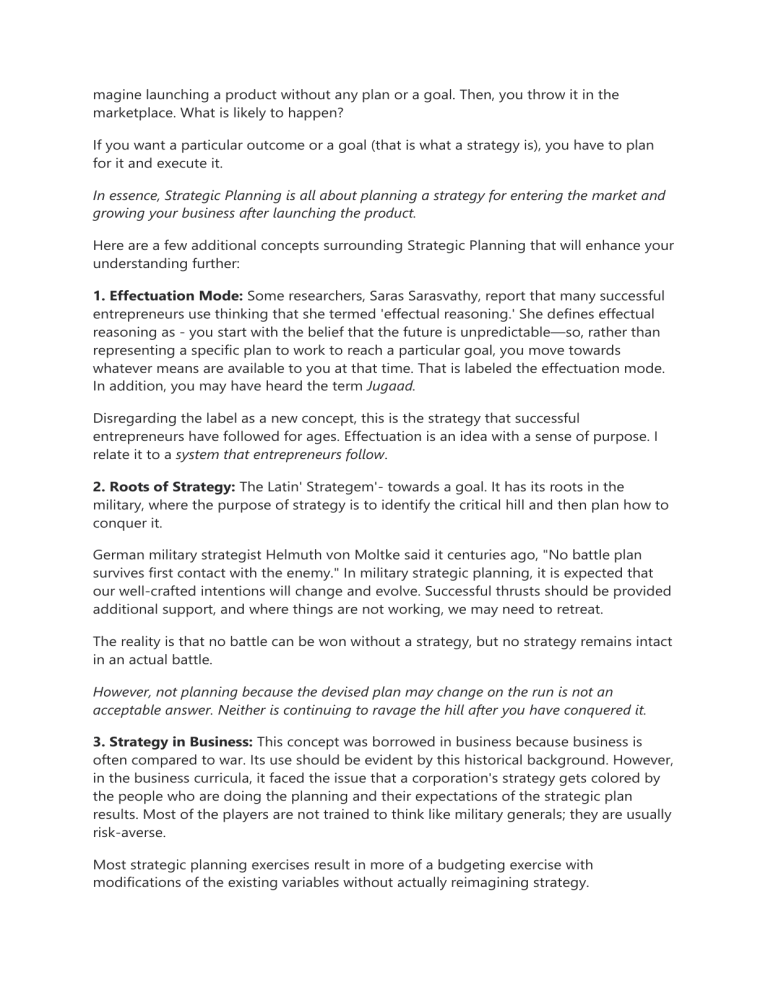
magine launching a product without any plan or a goal. Then, you throw it in the marketplace. What is likely to happen? If you want a particular outcome or a goal (that is what a strategy is), you have to plan for it and execute it. In essence, Strategic Planning is all about planning a strategy for entering the market and growing your business after launching the product. Here are a few additional concepts surrounding Strategic Planning that will enhance your understanding further: 1. Effectuation Mode: Some researchers, Saras Sarasvathy, report that many successful entrepreneurs use thinking that she termed 'effectual reasoning.' She defines effectual reasoning as - you start with the belief that the future is unpredictable—so, rather than representing a specific plan to work to reach a particular goal, you move towards whatever means are available to you at that time. That is labeled the effectuation mode. In addition, you may have heard the term Jugaad. Disregarding the label as a new concept, this is the strategy that successful entrepreneurs have followed for ages. Effectuation is an idea with a sense of purpose. I relate it to a system that entrepreneurs follow. 2. Roots of Strategy: The Latin' Strategem'- towards a goal. It has its roots in the military, where the purpose of strategy is to identify the critical hill and then plan how to conquer it. German military strategist Helmuth von Moltke said it centuries ago, "No battle plan survives first contact with the enemy." In military strategic planning, it is expected that our well-crafted intentions will change and evolve. Successful thrusts should be provided additional support, and where things are not working, we may need to retreat. The reality is that no battle can be won without a strategy, but no strategy remains intact in an actual battle. However, not planning because the devised plan may change on the run is not an acceptable answer. Neither is continuing to ravage the hill after you have conquered it. 3. Strategy in Business: This concept was borrowed in business because business is often compared to war. Its use should be evident by this historical background. However, in the business curricula, it faced the issue that a corporation's strategy gets colored by the people who are doing the planning and their expectations of the strategic plan results. Most of the players are not trained to think like military generals; they are usually risk-averse. Most strategic planning exercises result in more of a budgeting exercise with modifications of the existing variables without actually reimagining strategy. 4. Strategy at various company stages: At the startup stage, the structure is loose, and everybody pitches in to do whatever is needed. The key is to find a business model and strategy that begins to take hold in the marketplace. Without discovering that foothold, you are dead anyway. So the motivation is clear- get that hill. Then, you set the structure and throw more resources to follow that seemingly winning strategy when you get some success. So, strategy is paramount; they don't worry so much about structure. It is whatever it takes to get a foothold. However, once the initial objective of getting sales is achieved and the business receives an established foundation, the strategy begins to be replaced by inviolable operating procedures. Again, the purpose beholds the foothold, but to be more efficient, reduce, and further penetrate the marketplace. This is akin to assigning police duties to the army after capturing a strategic territory. Organizations continue to throw more resources to follow the seemingly winning strategy. Now new ideas to do different things become an irritant. We continue to call it Strategic Management but are loathe to deviate from the rut we have perfected. Companies die trying to do what made them initially successful and do not abandon their initial strategic plan. Unfortunately, the world has changed around them. The challenge of strategic management is that the very initial success plants the seeds of its future failure. This response is probably more than what you asked for, but I wish you great success with whatever was the reason for your question on strategy. 976 views View 4 upvotes Upvote 4 2 Intellipaat Sponsored Learn Data Science from IIT Madras faculty & industry experts. 50+ projects & case studies - Under expert guidance of IIT faculty & industry experts! Apply Now Upvote A strategy is a statement of a long term principle goal. For a business, it could be “Our strategy is to be the lowest priced in the market we serve.” For the Nazis in 1930’s Germany, it was “We will establish a dictatorship”. Tactical actions are shorter-term but should follow the strategy. For the business above it might be “we will own the source of our main material, to keep costs down.” For the Nazi’s the formation of the brownshirts, who could help foment troubles, break up other party meetings and push them into power was a sensible tactic to achieve their strategic goal.




